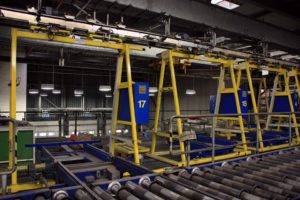
Whether you’re selling up and moving on or offloading one business to start another, you don’t want to leave money on the table. The more cash you get for your current business, the more you can invest into your new one.
So, how can you get the best price when selling a business in the steel industry?
How to Get The Best Price for Your Steel Business
It’s always a good time to sell in this industry. The steel fabrication sector is expected to grow by over 1% per year until 2029—not bad for an industry already valued at over $20 billion. If you’re looking to cash in on your success, there are a few ways to get maximum value:
Build a Varied Customer Base
Loyalty is everything in this sector, but that loyalty can change in an instant. Customers in the steel fabrication industry are often loyal to the individual and not the business—if you sell up and move on, they may follow, and that’s bad news for a potential buyer.
Buyers want to see that you have many loyal customers on your books. If you’re heavily reliant on a small group, it’s a huge red flag. Should one or more of them decide to jump ship, the business’s profits will take a hit and its value will drop, leaving the buyer in a very sticky situation.
Keep building relationships, bring more clients onboard, and make sure you present as a business that knows how to acquire new customers and keep existing ones happy.
Customer relationship management (CRM) solutions built into enterprise resource planning (ERP) systems can help you track customers and include features designed to sell more products while keeping customers happy.
Update Your Equipment
Whether it’s metal fabrication, coil processing, metal framing, or multi-line processing, your equipment is essential for ongoing operations. If your machines are old and poorly maintained, buyers will look elsewhere.
No one wants to buy a business where the first step is to invest significantly into new machinery, and if they are interested, it will likely be at a significantly reduced price.
Build Strong Relationships with Suppliers
Supplier relationships are just as important as customer relationships. If you’re constantly counting on unreliable suppliers, production will slow, costs will rise, and you’ll be at a disadvantage. It’s a concern for a potential buyer, as they don’t want to waste time finding new suppliers, and the more time and effort they need to expend, the less they will pay for your business.
Show them that you have strong, dependable suppliers who can give you what you need, when you need it, and for a reasonable cost.
Know the Numbers
It’s your business, and you’re expected to know every aspect off the top of your head. Nothing deters a buyer more than a business owner who can’t tell them how profitable they are.
Obviously, buyers want a business in good fiscal health, but they also want a business that can prove its financial worth with records that clearly show how much money is coming in, where it’s being spent, and where improvements can be made.
Modernize
Old equipment isn’t the only thing that can hold your business back. You also need modern systems and operations. Buyers want a business that allows for a seamless transition. They want to keep production going as they integrate their team and methods—the less disruption, the better.
ERP systems can help here, as well. They provide easy organization and operations and ensure that everyone is reading from the same hymn sheet. Relying on multiple programs can get very messy, but with a single source of truth provided by an ERP, the new owner will be able to transition easily.
Prepare for a Transition
Try not to get too involved with your business’ day-to-day operations. Delegate your daily tasks to high-ranking employees, ones who will still be there—potentially—following a change of ownership.
You don’t want to give the impression that a new owner must assume the role of an employee. Buyers want to buy and delegate; they want to know that the business can operate without them, and that means showing them that it’s currently operating without you.
Don’t Accept the First Offer
This is a general rule that applies to any industry, but it’s still worth mentioning.
If the first price you receive isn’t what you had in mind, keep pushing them to increase their offer. If that fails, reject the offer and move on.
Stay patient. Nothing happens quickly in this industry. It might take many months before you receive more interest, but that just gives you more time to fine-tune the business and make it more profitable and sellable.
How Much is My Steel Fabrication Business Worth?
Ultimately, your business is worth whatever someone decides to pay for it, and their value can depend on everything from current profitability to future projections and potential.
Generally, however, a buyer will set a value based on profits, usually settling on a number between 2 and 4% of its current gross profits.
If you foresee that the business’s profits will increase in the coming months or years, you may be better off waiting until those increases have been realized. A buyer is unlikely to share the same sentiments, and even if they do, they may still reduce the price to account for changes in market demand and regulations that could dampen those projections.
Summary: Selling Your Steel Business for the Best Price
Getting the best price for your steel fabrication businesses can take a lot of time and work, but we’re potentially dealing with big numbers here, and even a fractional increase could lead to a sizeable bump in the sale price.
If you need a helping hand in improving operations and driving up that final sale price, check out our ERP solutions. Our customized business management systems are tailored toward the steel and metal fabrication industry and provide a variety of solutions that help to increase profitability while presenting a great prospect for potential buyers.
Contact us today to request a demo and see our software in action.




